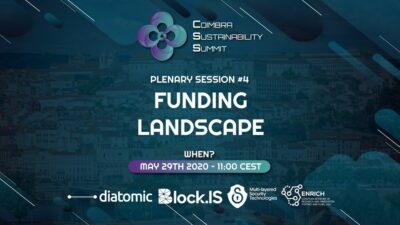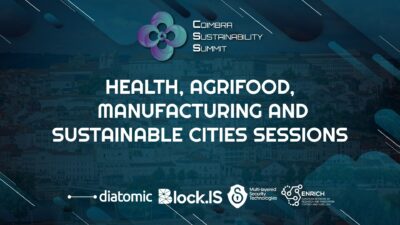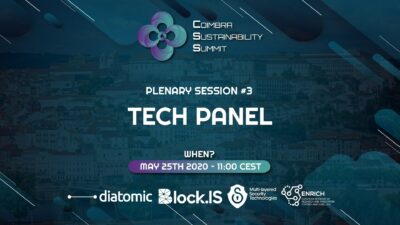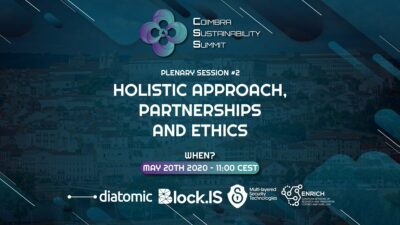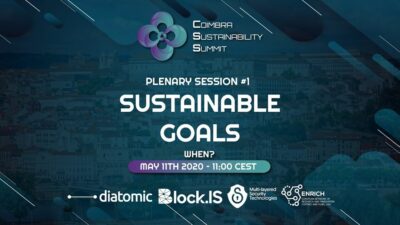Recap of Coimbra Sustainability Summit parallel sessions – Health, Agrifood, and Manufacturing&Sustainable Cities joint session
CSS parallel sessions intend to demonstrate how digital transformation can contribute to the United Nations 2030 Agenda for Sustainable Development. The objective of these sessions was not to debate current days but to contribute to understanding better how a digital transformation will support our quality of life, for example enhancing the main unmet needs that should drive the science agenda in the next ten years. Nevertheless, it is important to understand how the current situation with the Covid-19 will influence the UN’s SDGs as well as what we can learn with the COVID-19 Days related to digital transformation that can be used in the world after the pandemic.
Health Needs Session
The first parallel session “Health Needs” kicked off with the speech by António Cunha, Executive Director of Automatics Lab at Instituto Pedro Nunes (IPN). Like the moderators in the previous CSS sessions, António Cunha followed the same approach by introducing the participants with the vision of the CSS, ecosystem, and goals to inspire innovative approaches, foster new partnerships, and deliver better value out of the Summit. António focused on the objective of this particular session, which is to give the answer to two questions: What are the Needs of the Health sector & How digital transformation can support Health. Moreover, his speech involved the introduction of the speakers to the participants and agenda of the CSS regards to the program for the previous and as well as upcoming sessions.
Mr. Ramon Maspons Bosch opened the Health session. He is a Chief Innovation Officer (CINO) at the Agency for Health Quality and Assessment of Catalonia (AQuAS). Ramon’s experience lies in: Public Procurement of Innovation, Value-Based Procurement, Pre-commercial public procurement, Public-Private Partnerships, Innovation at hospitals, Research valorization, Competitive intelligence, Disruptive Thinking, and Predictive Intelligence, Strategic foresight, Futures studies. His presentation was about Fostering innovation through value-based procurement of innovative solutions interwoven with some lessons learned from Catalonia’s hospitals.
The session continued with the presentation of Mr. Alexandre Lourenço as our second speaker. He is a Healthcare Manager and a Ph.D. Candidate at NOVA School of Business & Economics. Alexandre is the President of the Portuguese Association of Hospital Managers, Board and Executive Committee member of the European Association of Hospital Managers (EAHM), Board member of the European Health Management Association (EHMA), International Associate of the American College of Healthcare Executives (ACHE) and Honorary Fellow of the Brazillian College of Health Executives (CBEXs). His presentation was about Healthcare as a place for partnerships and technology with the focus on the relationship between providers and users.
Ms. Carina Dantas closed the Health parallel session as our third speaker in a row. He is an Innovation Director at Cáritas Coimbra, a Portuguese NGO that provides health, social care, and education services. She has have written over 200 proposals for funded projects and managed to implement some of them in the field, with all its challenges, but also with many rewards – smiles, when people’s lives were really improved. In the meanwhile, he is a CEO of a small start-up, Project Manager for an international umbrella organisation and lately, she has been developing some more work on Ethics – such as the EU Ethics framework for the ICT Profession, as external expert for CEN and the Ethical guidelines for the AAL Programme. Her presentation covered the topic of “The User Perspective”. Why are we not in the future? What is the GAP between Tech Development and Implementation at Scale?
Agrifood Needs Session
The second parallel session “Agrifood Needs” kicked off with the speech by Stavros Tsitouras, a Senior Project Manager at BioSense Institute. Like the moderators in the previous CSS sessions, Stavros Tsitouras followed the same approach by introducing the participants with the vision of the CSS, ecosystem, and goals to inspire innovative approaches, foster new partnerships, and deliver better value out of the Summit. Stavros focused on the objective of this particular session, which is to give the answer to two questions: What are the Needs of the Agrifood sector & How digital transformation can support Agrifood. Moreover, his speech involved the introduction of the speakers to the participants and agenda of the CSS regards to the program for the previous and as well as upcoming sessions.
Mr. Grigoris Chatzikostas opened the Agrifood session as a first speaker. Grigoris is an expert in financing innovations for the digital transformation of the agrifood sector. He is managing multi-national and cross-sectoral consortia, developing proposals for EU funding and coordinating large-scale projects that promote tech-enabled entrepreneurship in the agrifood sector. In the past 15 years he has managed projects exceeding the total value of 100 mEUR. He has delivered programs supporting more than 150 startups and SMEs with pre-seed funding and business support services. As an engaging public speaker and trainer, he makes complex subjects related to EU funding and technologies accessible and easy to understand. He also offers mentoring and strategic consulting to a small number of carefully selected companies that are aligned with his interests. His speech was about how technology contributes towards sustainability and resilience.
The session continued with the presentation of Ms. Joana Costa, our second speaker. Joana Cardoso da Costa (JC) completed a Ph.D. Programme in Biomedicine and Experimental Biology at the University of Coimbra in 2008. She is a researcher and guest lecturer at the University of Coimbra and Director and Technical Manager of the Plant Health Laboratory of the Pedro Nunes Institute (Official Laboratory recognized by DGAV). Her presentation was about the Agri-food Systems, Global Drivers, Challenges, and Opportunities.
The session ended up with Dr. Ivana Gadjanski as our third speaker. She is a Research Associate Professor and Assistant Director for Science at BioSense Institute, University of Novi Sad, Serbia. She obtained Ph.D. in Neuroscience (summa cum laude -oral presentation) from Georg-August University & Max Planck Institute for Biophysical Chemistry, Goettingen, Germany (2007), and worked as a postdoctorate researcher at Ludwig-Maximillian University, Munich, Germany. Ivana then turned to the bioengineering field and spent a year as Fulbright Visiting Scholar at Columbia University, USA – Lab for Stem cells and Tissue Engineering. In BioSense Institute, she is moving further into the cellular agriculture field – developing solutions for cultivated meat. She is also working on other aspects of alternative protein research, such as alt.pro food safety-related issues. Therefore, according to her experience, her speech was about alternative protein and cellular agriculture.
Manufacturing & Sustainable Cities Needs joint session
This session was moderated by Ahmad Issa, the Senior Scientist at Fraunhofer IPA. Followed the same approach by introducing the participants with the vision of the CSS, ecosystem, and goals to inspire innovative approaches, foster new partnerships and deliver better value out of the Summit, Ahmad focused on the objective of this particular session, which is to give the answer on the questions: What are the Needs of the Manufacturing & Sustainable Cities sectors & How digital transformation can support those sectors.
Mr. Stefan Büttner opened the session as a first speaker. He is Director of Global Strategy & Impact at the Institute for Energy Efficiency in Production (EEP) and chairs the newly established UNECE Task Force on Industrial Energy Efficiency. As an initiator of global policy & industry benchmark, called ‘The Energy Efficiency Barometer of the Industry’ he facilitates demand-side informed efficiency action and delivered over 100 speeches in 30+ countries. He is a Vice-Chair of the Bureau of the United Nations Economic Commission for Europe (UNECE) Group of Experts on Energy Efficiency and a member of the Energy Efficiency Financial Institutions Group (EEFIG) of the European Commission & UNEP FI. His talk provided a deeper understanding of what many of the actual challenges in the manufacturing industry are, what critical role it plays in enabling us to meet the climate goals across all sectors, and gave evidence of the preparedness of the sector to make things happen. Likewise, he was giving some examples of where this is already happening and how to get there.
Mr. Christian Hein continued as the second speaker in a row. He is a Director of Corporate Energy & Climate Affairs at Aurubis AG. Since 2017, he is a Member of the DIN standards committee „Energy Efficiency and Energy Management “as well as Coordinator Energy Management & Efficiency Project Leader Industrial Heat since 2011. He shared with participants a short overview of the Aurubis sustainability strategy and introduced them with an interesting aforementioned project Industrial Heat.
Mr. Pedro Roseiro, Executive Board Member at TICE.PT and Innovation Advisor was our third speaker. TICE.PT is the Portuguese ICT Cluster and acts as an orchestration platform to create and nurture cooperation among Academia, RTOs, and Companies. He plays a special role in managing and developing international cooperation, has an active role at the EIP on Smart Cities and Communities, and in promoting cooperation projects. As a Consultant, he works from Strategy Design till Go-to-Market and Partnership Management, including project financing. He benefits from a wide experience in R&D+I, access to a large network of relevant actors, and more than 15 years acting as CTO, CINO, COO, or CEO in ICT companies (software development and information systems consultancy). His presentation was about the Cities’ role in digital (and green) transformation.
Ms. Keiko Doguchi closed the session as a fourth speaker. She is the Project Coordinator of the M-Sec Project on the Japanese side and has been involved in EU-JP collaboration research projects since 2014. She is also a managing director for SME called PortHofner, Inc in Japan and project manager of IT-related projects such as Furusato Telework project funded by MIC. She introduced the audience with the M-Sec project. M-Sec is an international collaborative research project between Europe and Japan, which stands for Multi-layered Security technologies to ensure hyperconnected smart cities with Blockchain, Big Data, Cloud and IoT. The main goal of the M-Sec project is to research, develop, deploy, and demonstrate multi-layered Security technologies to ensure smart cities. Her speech was related to the trends of the IT security industry and what M-Sec is going to deliver for the security challenges.
All the presentations in the sessions were followed by a Q&A session between our participants and the CSS panelists including everyone in the conversation using the Poll Everywhere through pollev.com interactive concept, which led to fruitful discussions and useful conclusions on the relevant topics to our CSS participants.
In the end, all parallel session included their separated Brokerage sessions which were the period where all participants who have registered for this opportunity had 2 minutes to in brief present themselves, their organization, and what are they looking for. The Brokerage session was a chance for the participants to network as well as business opportunities within their industries and sectors that go beyond CSS. This is one of the key aspects of such events because it provided our participants with a great opportunity to interact by facilitating quality networking and raising the potential for new business deals and ventures.
Save your spot for the upcoming sessions!

